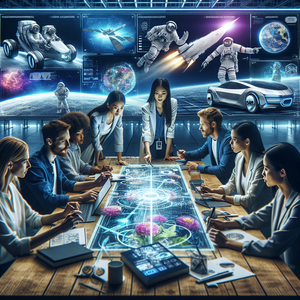From Software to Space: The Unexpected Ventures of a Young Entrepreneur

Musk's entrepreneurial journey began in the mid-1990s with Zip2, a city guide software for newspapers. Launched in 1996, Zip2 sought to provide businesses with an online presence and was ahead of its time, combining mapping technology with business directories. Despite facing numerous challenges, including skepticism from potential investors and the need to pivot the business model, Musk's innovative strategies proved effective. He recognized the power of the internet and local search, pushing Zip2 to become a valuable asset that eventually sold for nearly $300 million in 1999. This early venture laid the groundwork for Musk's future successes. He learned the importance of adaptability and foresight in a rapidly changing tech landscape. With the capital gained from Zip2, Musk co-founded X.com, which would later become PayPal. His vision for a digital wallet was revolutionary, streamlining online banking and setting the foundation for the digital payment systems we rely on today. Musk's experiences during these formative years not only honed his technical skills but also instilled a risk-taking mentality that would define his later ventures. The sale of PayPal to eBay for approximately $1.5 billion in 2002 provided Musk with the resources to pursue even more ambitious projects.
A Leap of Faith: Transitioning to Space Exploration
After cashing out from PayPal, Musk’s ambitions soared to new heights—literally. In 2002, he founded SpaceX with the audacious goal of reducing space transportation costs and making interplanetary colonization possible. Many viewed this move as reckless; the aerospace industry was notoriously difficult to penetrate, and SpaceX faced skepticism from seasoned experts. However, Musk’s past experiences taught him to embrace risk and focus on long-term vision. Musk’s first attempt at launching a rocket, the Falcon 1, ended in failure. The maiden flight in March 2006 did not reach orbit, and subsequent attempts in 2007 and 2008 also ended in disaster. Yet, he did not waver. Instead, Musk analyzed the failures, learned from them, and poured further investment into refining the technology. By 2008, SpaceX achieved its first successful launch, marking a turning point in private space exploration. The Falcon 1's success was a testament to Musk's willingness to take calculated risks, coupled with his relentless determination, which paved the way for innovations that would allow SpaceX to reduce launch costs dramatically—challenges that seemed insurmountable just years prior. SpaceX's achievements continued to mount with the introduction of the Falcon 9 rocket and the Dragon spacecraft, which became the first commercial spacecraft to deliver cargo to the International Space Station. These milestones not only showcased Musk's visionary approach but also solidified SpaceX's role as a leader in the aerospace industry.
Innovative Mindset: The Engine of Ambition
Musk's journey from software to space is not just about the ventures he has undertaken; it also reflects a unique mindset that blends innovation with risk management. He often emphasizes the importance of embracing failure as a necessary step toward success. In his view, the risks associated with groundbreaking ventures are worth taking, especially when the potential rewards can change the world. This philosophy is evident in his approach to Tesla. Entering the automotive industry, Musk faced skepticism about the viability of electric vehicles. Many critics doubted that electric cars could compete with traditional gasoline vehicles in terms of performance and consumer acceptance. Yet, leveraging lessons from his earlier ventures, he positioned Tesla not just as a car manufacturer but as a technology company focused on sustainable energy solutions. By aligning his business strategies with a vision for a sustainable future, Musk was able to create a brand that resonates deeply with consumers today. The introduction of the Tesla Model S in 2012, which won numerous awards for its performance and safety, marked a significant turning point, proving that electric vehicles could be desirable and practical.
Elon Musk's journey from tech startups to space exploration illustrates the remarkable potential of marrying innovation with a calculated risk-taking mentality. His early experiences in the tech industry equipped him with the tools and insights necessary to tackle the challenges of space exploration and revolutionize the automotive industry. Musk's story serves as an inspiration for entrepreneurs and innovators, highlighting the importance of resilience, adaptability, and a bold vision for the future. As we continue to witness Musk's ambitious projects unfold, including plans for Mars colonization and sustainable energy solutions, one thing remains clear: the sky is not the limit; it is just the beginning. His ventures not only aim to advance technology but also to inspire a generation to dream bigger and think beyond the conventional boundaries of possibility. With each successful launch and groundbreaking innovation, Musk encourages us all to reach for the stars, both literally and figuratively.
Aerospace Systems Engineer
SpaceX, Boeing, Lockheed Martin
Core Responsibilities
Design, analyze, and test aerospace systems and components, including propulsion and avionics.
Collaborate with cross-functional teams to ensure project milestones are met and technical requirements are fulfilled.
Conduct simulations and modeling to validate design concepts and improve system performance.
Required Skills
Proficiency in CAD software and aerospace simulation tools (e.g., MATLAB, Simulink).
Strong understanding of aerodynamics, materials science, and control systems.
Experience with systems engineering processes and documentation.
Product Manager for Electric Vehicles
Tesla, Rivian, Lucid Motors
Core Responsibilities
Oversee the development and launch of electric vehicle products from concept to market.
Conduct market research to identify consumer needs and competitive landscape.
Coordinate with engineering, marketing, and sales teams to align product features with business strategy.
Required Skills
Strong project management skills and ability to multitask across various projects.
Knowledge of automotive industry trends and electric vehicle technology.
Excellent communication and presentation skills for stakeholder engagement.
Robotics Software Engineer
NASA, SpaceX, Boston Dynamics
Core Responsibilities
Develop and implement software for robotic systems used in manufacturing and space exploration.
Collaborate with hardware engineers to integrate software with robotic platforms.
Perform testing and debugging to ensure software reliability and performance.
Required Skills
Proficiency in programming languages such as Python, C++, and ROS (Robot Operating System).
Familiarity with machine learning algorithms and computer vision techniques.
Experience with real-time operating systems and embedded systems.
Renewable Energy Analyst
Tesla, NextEra Energy, Enphase Energy
Core Responsibilities
Analyze market trends and technologies in renewable energy to inform strategic decisions.
Evaluate the feasibility and financial viability of renewable energy projects.
Prepare reports and presentations for stakeholders on energy consumption and sustainability initiatives.
Required Skills
Strong analytical and quantitative skills, with proficiency in data analysis software (e.g., Excel, Tableau).
Knowledge of energy policy, market dynamics, and regulatory frameworks.
Excellent communication skills to convey complex information clearly.
Business Development Manager in Space Technology
Blue Origin, SpaceX, Northrop Grumman
Core Responsibilities
Identify and pursue new business opportunities in the aerospace and space technology sectors.
Build and maintain relationships with potential clients and partners to drive growth.
Conduct competitive analysis and market research to inform business strategy.
Required Skills
Proven experience in business development, sales, or account management within the aerospace industry.
Strong negotiation and interpersonal skills to foster partnerships.
Understanding of space technology and innovation trends.


